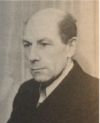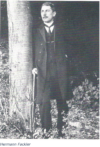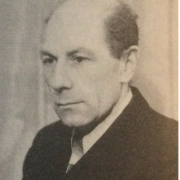Hermann Fackler
Hermann Fackler, March 10, 1886, Lörrach – July 19, 1978, Stuttgart
 Hermann Fackler, too, was already a long-serving pastor when The Christian Community was founded. At thirty-six, he belonged to the group of the older ones at that time. Nevertheless, he was still able to serve the movement for over fifty years.
Hermann Fackler, too, was already a long-serving pastor when The Christian Community was founded. At thirty-six, he belonged to the group of the older ones at that time. Nevertheless, he was still able to serve the movement for over fifty years.
Hermann Fackler was born in Lörrach on April 10, 1886, as the son of a Protestant veterinarian and a Catholic mother from Breisach. He was baptized Catholic. His mother died shortly afterward as a result of the birth, so his father had to place his young son in the care of a loving, simple cobbler family for the first seven years. In the first ten years of his life, the boy was not spared serious childhood illnesses. Due to whooping cough, he suffered a lifelong ear ailment. For the next two and a half years, however, he was healthy and spry, apart from an accident in the icy Sudeten Mountains, which later afflicted him greatly.
When his father married again, this time to a Protestant woman, the boy was allowed to move in with his parents in Donaueschingen in 1893. He attended the humanist grammar school and Protestant religious instruction but also had deep religious experiences when visiting his mother’s relatives in Breisach and Freiburg and attending mass in the cathedrals there.
When his father was transferred to the Ministry of the Interior in Karlsruhe in 1898, his son attended confirmation classes with the city pastor Brückner, who impressed him so much that the boy wanted to become a pastor himself. Immediately after graduating from high school in 1905, he went to Heidelberg University, where he studied philosophy with Wilhelm Windelband, dogmatics with Ernst Troeltsch, and exegesis with Adolf Deißmann. He went to Berlin for two semesters to hear Adolf von Harnack lecture on church history and Reinhold Seeberg on dogmatics. All these professors have gone down in the history of science with their life’s work.
Nevertheless, for the young man, the study was unsatisfactory. It brought a lot of useless head knowledge (textual criticism, for example) and no preparation for religious practice. One learned to preach but not how to pray with people. The theoretical and practical examinations were taken in 1908/09. Then followed vicar positions in Baden, among others in Waldshut on the Rhine, where he met his wife. He received a position as “pastoral chaplain” in Immendingen (Hegau) in 1912. His wife, Getrud, née Leyendecker, had been a deaconess in Freiburg and was able to help him with the care of a large parish area and several military hospitals in the following years during the First World War.
If the discrepancy between studied theology and practiced religion was already difficult for Hermann Fackler, the problems grew even greater when he became intensively involved with the star mythology of Professor Arthur Drews from Karlsruhe during these years (1913-1919). He knew Drews personally from many visits and found access to the cosmic aspect in his book Die Christusmythe [The Christ Myth]. But how could he proclaim death and resurrection if Christ had not lived at all? Even the philosophy of ‘as if’ only helped to reach an insipid compromise.
In 1919 Hermann Fackler became parish administrator in Rheinfelden on the Upper Rhine, not far from Basel. The dean who introduced him invited him to his Freemason lodge because of his inaugural sermon (on 1 Peter 2:5), in which a word about Freemasonry had been spoken. The dean was Master of the Chair. Thus Hermann Fackler became an ‘apprentice’ in the Lodge “Friedrich zur Eintracht” in Lörrach and found cultic brotherly fellowship in which he could feel a remnant of the air of mystery.
In September 1920, a blind man asked Hermann Fackler to come with him to Dornach near Basel to see Rudolf Steiner’s ‘crazy house’ through his eyes. This is how Hermann Fackler found his way to the first Goetheanum and was immediately enthusiastic. He and his wife then went repeatedly to Dornach. They attended eurythmy performances and began to read Rudolf Steiner’s books.
 In the autumn of the following year (1921), he took a short holiday with his wife in nearby Waldshut that was broken off after a week due to inner turmoil. At home, a single letter was found that had not been forwarded. It was an invitation from a completely unknown Rudolf Meyer from Stuttgart to come to Dornach for the theology course which was about to begin.
In the autumn of the following year (1921), he took a short holiday with his wife in nearby Waldshut that was broken off after a week due to inner turmoil. At home, a single letter was found that had not been forwarded. It was an invitation from a completely unknown Rudolf Meyer from Stuttgart to come to Dornach for the theology course which was about to begin.
Hermann Fackler immediately arranged everything necessary and commuted daily from Rheinfelden to Dornach to attend the autumn course. There, the true science of God dawned on him when he experienced Rudolf Steiner for the first time and absorbed his lectures. And he immediately committed himself to the movement, which wanted to renew Christian religious practice with liturgical celebrations.
So he resigned from his ministry on July 1, 1922, and later even resigned from the church, for he had now found his spiritual home and his real task, which he was to serve for another half-century.
He was present in Breitbrunn for the preparatory meeting of the founders and was ordained on September 16, 1922, in Dornach at the Goetheanum, to whose forms he owed his first access to anthroposophy. When he asked Rudolf Steiner whether he should begin the congregational work of The Christian Community in Rheinfelden – also because people there had already asked – he did not find it possible. In November 1922 the church began in Constance (until August 1924). This was followed by important years of work in Berlin (1924-1929). In Naumburg/Saale, he then replaced Eberhard Kurras in the activity (1929-1931, until some difficult working years in Göppingen (Württ.) followed (1931–1936), after which Reutlingen became his place of residence for over forty years. (1936–77).
Hermann Fackler survived the ban on community work (1941) smoothly – without imprisonment and almost without theft of books. He then worked as a gardener and in the tax office, and finally as a language teacher with tutoring, before work in the community could begin again after the end of the war in 1945.
 In the fifties, it was possible to buy a house and build a community room in Goethean style, which still serves the community today. Beginning with the first volume of The Christian Community magazine, a wealth of essays by Hermann Fackler has appeared, reflecting the breadth of his education and interests. He also published articles in other journals and newspapers, such as Die Kommenden, Blätter für Anthroposophie, Entscheidung, Die Drei, Die Tat, and others. He also wrote poetry and painted. As a lecturer, however, he was less prominent. He worked in silence through many visits and conversations and appeared outwardly closed.
In the fifties, it was possible to buy a house and build a community room in Goethean style, which still serves the community today. Beginning with the first volume of The Christian Community magazine, a wealth of essays by Hermann Fackler has appeared, reflecting the breadth of his education and interests. He also published articles in other journals and newspapers, such as Die Kommenden, Blätter für Anthroposophie, Entscheidung, Die Drei, Die Tat, and others. He also wrote poetry and painted. As a lecturer, however, he was less prominent. He worked in silence through many visits and conversations and appeared outwardly closed.
However, he met people with constant friendliness and kindness. Perhaps his quiet manner was also due to his suffering from his ear. Fully aware of this, he continued to work spiritually until he was very old – he translated St Augustine – before ending his final years on July 19, 1978, in the Haus Morgenstern nursing home in Stuttgart.
MEMORANDUM
I, the undersigned, born in 1886 and after eight semesters of theological and philosophical studies and active since 1909 in the service of the Protestant Regional Church of Baden, see myself compelled, after conscientious self-examination, to make the following declaration: I became aware of the anthroposophical movement in 1920. After initially reading a few critical writings and systematic presentations of anthroposophy, I soon began to study Dr. Steiner’s writings myself, as far as they were available to me through the book trade. Soon seized by this study, I spent every hour that my ministry allowed me with it. I visited the Goetheanum several times to gain a personal impression of spiritual science and its building in Dornach. So it was with joy that I accepted an invitation to take part in the religious course in Dornach, which took place there from September 26 to October 10 last year under the direction of Dr. Steiner. The impressions I received from what I heard there, as well as in personal contact with the participants in the course, were so profound that even then, the decision matured in me to adjust my life to the new movement, and I signed the pledges made in Dornach. Soon after completing the Dornach course, I was accepted into the Anthroposophical Society, so that Dr. Steiner’s esoteric lecture cycles now became accessible to me, at least in part. The study of these cycles, especially the cycle on the Gospel of John, the inner processing of what I had received in Dornach, the daily practice of meditation, all advanced me inwardly to such an extent that I now feel inwardly impelled to make the following solemn and binding declaration: I am ready and determined to apply for my release from the pastoral ministry as soon as accommodations are available for my family and me in the sphere of activity I have already envisaged, in order then to place myself entirely at the service of the anthroposophical religious movement and to serve the spread of this movement with all my strength. I would gratefully welcome it if Dr. Steiner could give a preparatory course to those who are ready for this life’s work, in which all that is connected with this work would be discussed.
Badisch Rheinfelden, February 20, 1922
Hermann Fackler


Leave a Reply
Want to join the discussion?Feel free to contribute!